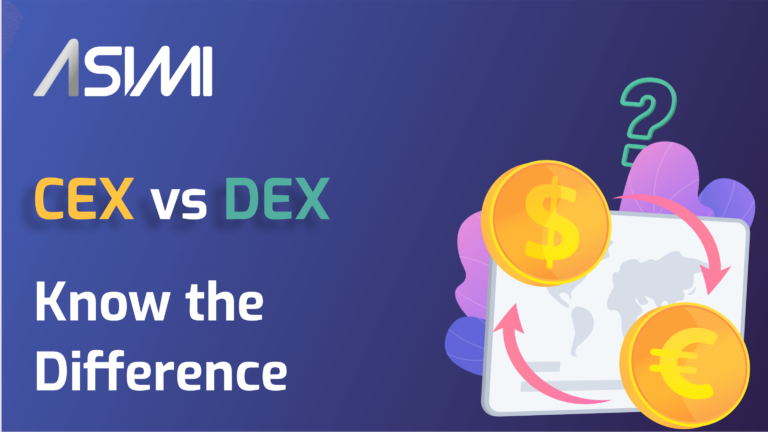
When shopping around for the best crypto exchange to use, CEX and DEX are two words you will most likely come across. These are simply different types of exchanges that you can use to trade cryptocurrencies.
In this guide, we will be comparing CEX and DEX side-by-side to enable you to choose the right fit for your trading needs. We will look at a general overview of each type of exchange, their differences, similarities and finally, a verdict on which exchange you should use to trade.
CEX vs DEX: General Overview
Before we can dive into the similarities and differences between CEX and DEX, let’s go through a quick overview of what each type of exchange is all about.

What is CEX?
CEX stands for centralized exchange. This is simply an online crypto trading platform that is controlled by a central body. This means that buyers and sellers are matched using a traditional orderbook, just like with brokerage accounts. The central body that owns the exchange acts as the intermediary between the crypto seller and buyer.
CEXs are the original and most common types of crypto exchanges. And since they are more popular than DEX, they are known to have more liquidity and are generally easier to use. They are, however, considered less secure than DEX since they directly store user assets.
Some of the most popular centralized exchanges include:
What is DEX?
DEX stands for decentralized exchange. This is a peer-to-peer (P2P) crypto exchange that is not controlled by any central organization. Unlike CEXs, DEXs are non-custodial, which means users are in full control of their private keys and assets.
So, instead of depending on an intermediary, buyers and sellers transact directly with each other. The intermediary in traditional centralized exchanges is replaced by smart contracts, which are programs that automatically execute when set conditions are met.
Some of the most common decentralized exchanges include:
- Uniswap
- Venus
- Sushiswap
- Compound
- BurgerSwap
- Curve Finance
Main Differences Between CEX and DEX
Centralized and decentralized exchanges mostly differ in terms of:
- Custody of Assets
- Regulations
- Liquidity
- Ease of Use
- Security
Custody of Assets
As we already mentioned, CEXs are custodial while DEXs are non-custodial. This simply means that centralized exchanges are controlled by an intermediary while decentralized exchanges are not.
In other words, when you use a CEX, you are required to trust your assets in the custody of the exchange for you to be able to trade. However, with a DEX, you have exclusive control over your assets and don’t have to deposit anything to exchange.
Regulations
Because CEXs are custodial, they tend to be more regulated than DEXs. In particular, they have what is known as the Know Your Customer (KYC) onboarding process. This means that you will need to provide personally identifiable information to be able to join the exchange. Decentralized exchanges do not require this.
This makes CEXs less desirable if you are looking for privacy and anonymity. However, due to their regulations and KYC policies, CEXs are more likely to attract institutional investors compared to DEXs.
Liquidity
Centralized exchanges are typically more liquid than decentralized exchanges. This means that you can quickly exchange assets at the current market value. While DEXs usually use liquidity pools in automated market markers (AMM), their liquidity growth is bottlenecked by regulatory insufficiencies.
Since they are not well-regulated, they do not attract many whale investors, which means they have significantly fewer assets compared to centralized exchanges at any given time.
Ease of Use
One of the biggest reasons why CEXs are still more popular than DEXs is because they are easy to use. They have a straightforward user interface making them the perfect option for new crypto investors.
DEXs, on the other hand, offer a less endearing user experience and may scare beginners away.
Security
While centralized exchanges invest a lot in ensuring top security, DEXs get the upper hand. There are two main reasons why decentralized exchanges are more secure. First of all, the fact that they are non-custodial means that they are not vulnerable to hacking.
This is because no private keys are stored centrally like a CEX, so it is hard for hackers to access them. Secondly, since they do not have strict KYC policies, you won’t be providing any sensitive information that could be used for hacking or identity theft.
So, Which Exchange Should Trade On?

So, should you trade on a CEX or DEX? Let’s find out.
When to Use CEX
- When you want to trade large amounts of cryptocurrencies
- If you just started trading and looking for a user-friendly exchange
- If you are looking for a well-regulated exchange
- If you are looking for more advanced trading features
When to Use DEX
- If you are looking for privacy and anonymity
- If you don’t want to pay high trading fees
- If you care about security
Final Verdict
Obviously, there is no one fits all solution to whether you should use a DEX or CEX. It all comes down to your needs and preferences. If you want more liquidity, regulations, ease of use and more trading options, use a DEX. On the other hand, if you want more security and anonymity and are looking for a larger variety of cryptocurrencies to trade, you should go with a DEX.
Read More:
>> How to Transfer Crypto to Hard Wallet
>> What is Web 3.0 and Why Is It Important?
